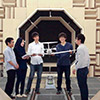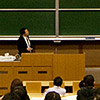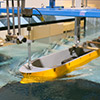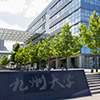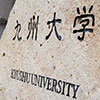International Course for Sustainable Environmental Engineering
Introduction of each Department and Professors
Contacts
Topics/News
As of 26 January, 2024
| Information | Details |
|---|---|
| The "International Environmental System Engineering Exchange Seminar" will be held as the Details. | Date and Time: Friday, February 16, 2024 10:30 a.m. - 12:00 p.m. Setup and preparation will begin at 9:00 a.m.Place: West Bldg. 2, 2nd floor hall, Kyushu UniversityPoster Presentation First-year students of the International Human Resource Development Course for Sustainable Environmental Engineering in the Doctoral Program This is a required part of the course. The content of the presentation includes an outline introduction of the research, research results to date and research plans for the upcoming period of study, and expected results. Please make sure that your presentation is easy to understand for people from different fields of specialization from your own. Setup and preparation will begin at 9:00 a.m. on the day of the event. Course students are requested to cooperate. |
Program Purpose
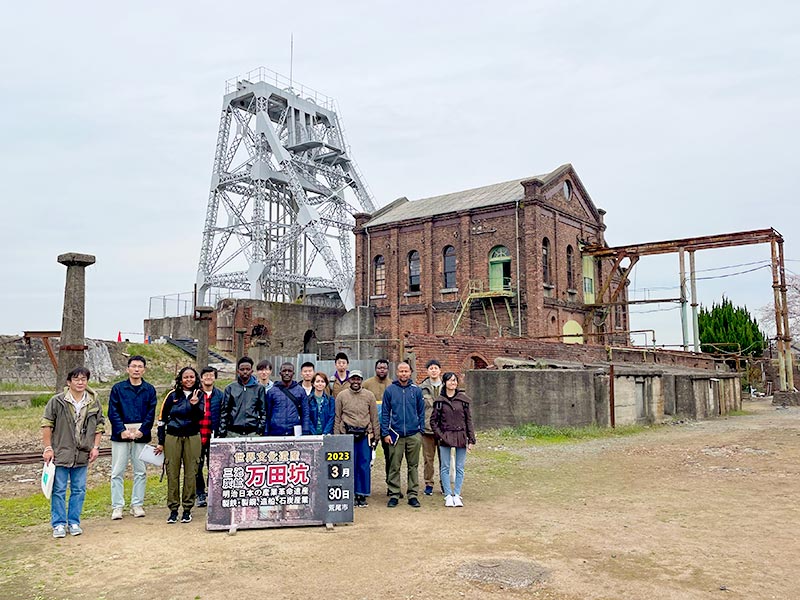 In recent years, global climate change, believed to be the result of global warming, has caused large-scale disasters around the world, and the trend toward decarbonization as a fundamental solution to this problem has accelerated worldwide. On the other hand, the global turmoil caused by soaring fossil fuel prices resulting from international conflicts has once again highlighted the fact that it is not easy to achieve both a stable energy supply and decarbonization. In order to solve the current global environmental problems, it is essential to foster human resources who can tackle these problems by not only acquiring knowledge of individual issues, but also advanced expertise based on an outlook that integrates the different fields related to these problems. The goal of this program is thus to train researchers and engineers who are experts in geo-environmental engineering.
In recent years, global climate change, believed to be the result of global warming, has caused large-scale disasters around the world, and the trend toward decarbonization as a fundamental solution to this problem has accelerated worldwide. On the other hand, the global turmoil caused by soaring fossil fuel prices resulting from international conflicts has once again highlighted the fact that it is not easy to achieve both a stable energy supply and decarbonization. In order to solve the current global environmental problems, it is essential to foster human resources who can tackle these problems by not only acquiring knowledge of individual issues, but also advanced expertise based on an outlook that integrates the different fields related to these problems. The goal of this program is thus to train researchers and engineers who are experts in geo-environmental engineering.
This program targets in particular Asia and Africa, which are rich in energy and metallic mineral resources and undergoing rapid development. While economic development is prioritized in these regions, environmental and disaster
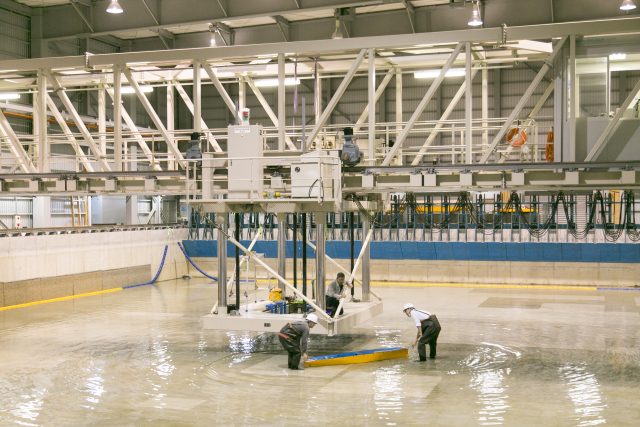
countermeasures lag behind, and development in these regions is far from sustainable. As a result, development in these regions is exacerbating global environmental problems, while climate change then acts to cause extensive disaster damage in these regions which are particularly vulnerable to disasters. Therefore, it is extremely important to deepen young people's understanding of global environmental problems and the resulting climate change and disasters in these regions, and to foster their interest in countermeasures against such problems, not only for the healthy development of these regions but also for solving global environmental problems without borders.
In order to achieve the aforementioned goals, this program will, with the collaboration of the Department of Earth Resources Engineering, the Department of Civil Engineering, the Department of Naval Architecture and Ocean Engineering, and the Department of Applied Quantum Physics and Nuclear Engineering, provide education in the areas of renewable energy, quantum energy, resource development, the underground and sub-seabed storage, and land and marine infrastructure development for disaster prevention and mitigation in collaboration with the Department of Earth Resources Engineering, the Department of Civil Engineering, the Department of Naval Architecture and Ocean Engineering, and the Department of Applied Quantum Physics and Nuclear Engineering. In addition to the lectures, fieldwork related to the above will be conducted. In addition to lectures, students will be trained to apply their expertise to other fields and to create new ideas by integrating knowledge from multiple fields through field training and discussions among course students in seminars on global environmental issues. In addition, since these field training programs and seminars are attended by students of many nationalities, including Japanese students, they are expected to have the secondary effect of fostering cross-cultural understanding and internationality. In addition, for students whose native language is not English, experts will teach them how to write scientific papers and give presentations at international conferences, so that they can acquire the skills needed to become world-class researchers.
Distinctive curriculum
The four departments participating in this program are The Department of Applied Quantum Physics and Nuclear Engineering, the Department of Earth Resources Engineering, the Department of Civil Engineering, the Department of Naval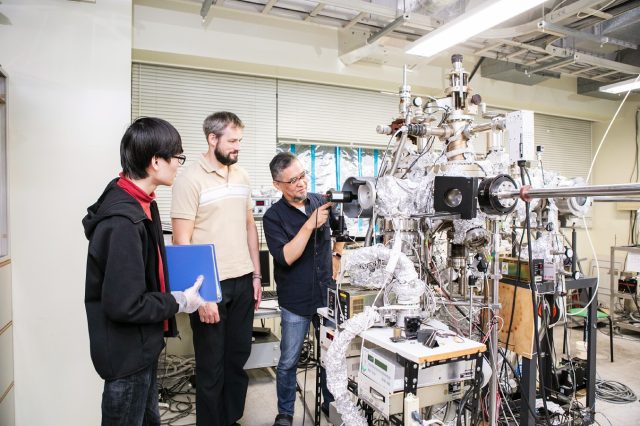 Architecture and Marine Engineering of the Graduate School of Engineering of Kyushu University. Each of the four departments has its own unique approach to global environmental issues from its own specialized fields, such as the development of renewable energy such as geothermal and offshore wind power, application of quantum technology in the energy field, development of metal and mineral resources essential for batteries and solar panels, CO2 underground and sub-seafloor storage, and development of disaster-resistant social infrastructures. The four majors are working together to develop new technologies in the field of quantum technology, which is essential for batteries and solar panels. The collaboration among these four majors allows course students to view global environmental issues from a variety of perspectives, and to acquire a broader perspective for considering solutions, which integrates the different fields related to these issues.
Architecture and Marine Engineering of the Graduate School of Engineering of Kyushu University. Each of the four departments has its own unique approach to global environmental issues from its own specialized fields, such as the development of renewable energy such as geothermal and offshore wind power, application of quantum technology in the energy field, development of metal and mineral resources essential for batteries and solar panels, CO2 underground and sub-seafloor storage, and development of disaster-resistant social infrastructures. The four majors are working together to develop new technologies in the field of quantum technology, which is essential for batteries and solar panels. The collaboration among these four majors allows course students to view global environmental issues from a variety of perspectives, and to acquire a broader perspective for considering solutions, which integrates the different fields related to these issues.
Admission Policy
The type of student we seek
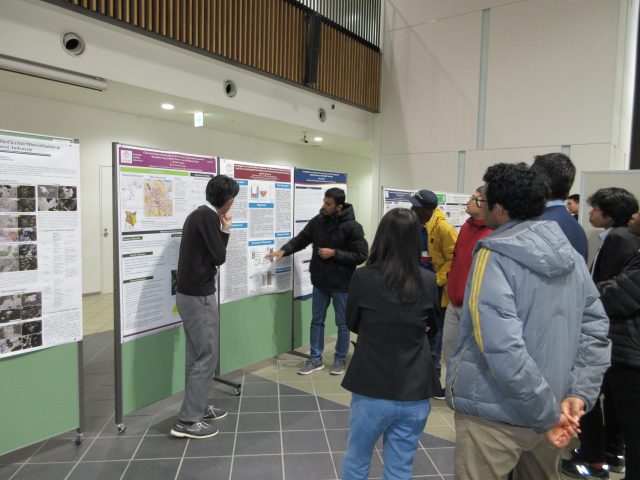 This course is designed for international students from Asia and Africa, including the Middle East, who have completed a master's degree or have the same level of academic ability and research experience, and who wish to acquire advanced expertise and interdisciplinary knowledge in environmental engineering through an educational program in which multiple disciplines collaborate to address issues related to global environmental problems such as resources, energy, marine development, civil engineering, disaster prevention and mitigation, and the urban environment. The program seeks students with strong aspirations to become researchers and engineers who can play an active role on the international stage, who have acquired advanced expertise and interdisciplinary knowledge in environmental engineering through educational programs conducted in cooperation with multiple disciplines, and who have the practical skills to contribute directly to the achievement of the United Nations' Sustainable Development Agenda (SDGs). Specifically, we will evaluate the following criteria and seek international students who possess these qualities.
This course is designed for international students from Asia and Africa, including the Middle East, who have completed a master's degree or have the same level of academic ability and research experience, and who wish to acquire advanced expertise and interdisciplinary knowledge in environmental engineering through an educational program in which multiple disciplines collaborate to address issues related to global environmental problems such as resources, energy, marine development, civil engineering, disaster prevention and mitigation, and the urban environment. The program seeks students with strong aspirations to become researchers and engineers who can play an active role on the international stage, who have acquired advanced expertise and interdisciplinary knowledge in environmental engineering through educational programs conducted in cooperation with multiple disciplines, and who have the practical skills to contribute directly to the achievement of the United Nations' Sustainable Development Agenda (SDGs). Specifically, we will evaluate the following criteria and seek international students who possess these qualities.
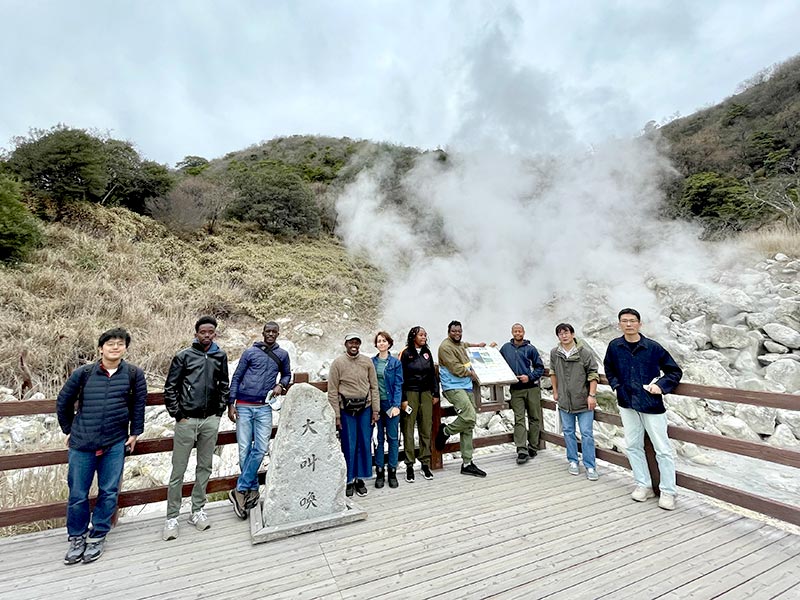
(1) Basic knowledge of one of the engineering fields related to the global environment, such as natural resources, energy, marine development, civil engineering, disaster prevention and mitigation, and urban environment.
(2) Have the necessary level of education and sense of ethics required to become researchers or engineers.
(3) The student should have the motivation and initiative to actively pursue his or her studies.
(4) Have the linguistic ability to cope with lectures, fieldwork, and research guidance conducted in English.
(5) Have the ability to persevere in the pursuit of truth.
(6) Possess the attitude and qualities to independently explore issues and promote research activities.
Curriculum Policy
Curriculum Policy
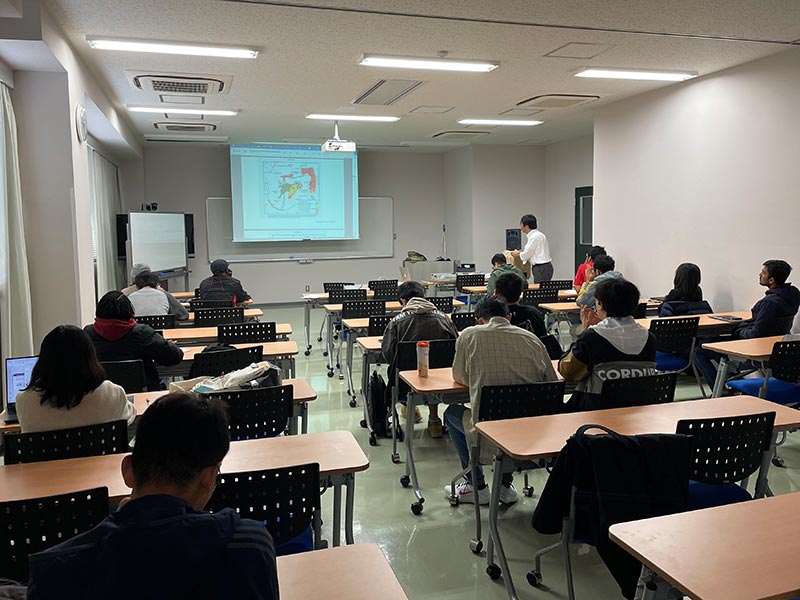
Lecture Scene
The Department of Applied Quantum Physics and Nuclear Engineering, the Department of Earth Resources Engineering, the Department of Civil Engineering, the Department of Naval Architecture and Marine Engineering of the Graduate School of Engineering of Kyushu University, which are directing this program, have established an education and research system that enables students to tackle various issues related to the global environment such as metal and mineral resource development, energy development, ocean development, social infrastructure development, urban environmental problems and disaster prevention and mitigation technologies from an engineering perspective. The program has established an education and research system that enables students to tackle various issues related to the global environment from an engineering perspective in a comprehensive and cross-discipline manner, and actively accepts international students to strongly promote the development of capable international human resources. The lectures offered in this program are designed to enable students to acquire basic interdisciplinary knowledge across an extremely wide range of engineering fields that deal with various issues related to the global environment, such as those mentioned above.
Degree Awarding Policy

This photo shows The Center for Research and Education of Environmental Technology, Faculty of Engineering
Students attend lectures here in the seminar room.
This program aims to foster researchers and engineers who have acquired advanced expertise in multiple engineering fields related to the global environment in a cross-discipline manner, and who have the ability to solve problems by bringing together and applying this knowledge. In line with this, the following diploma policies have been established.
- 〇Students must acquire advanced expertise in various engineering fields related to the global environment, and be able to utilize this knowledge to promote their own research with originality.
- 〇To be able to collect knowledge from domestic and overseas fields of expertise related to the global environment, solve problems in the field of environmental engineering based on original ideas, and pioneer new problems and fields.
- 〇Based on an understanding, both in a domestic and international context, of the needs of the global environment and the sources and mechanisms of its associated problems, acquire leadership skills, and the ability to contribute to solving problems in a practical manner.
- 〇The student should possess sufficient power of expression, language skills, paper writing skills, discussion skills, and communication skills required to make presentations at international conferences, etc., and should be able to propose the originality of his/her own research to the outside world.
- 〇The student should be able to supervise collaborators in the execution of research and have the ability to conduct research management.
〇The degree of Doctor of Engineering will be awarded to international students who have passed the examination of their doctoral thesis and the final examination in accordance with the degree awarding policy described below.
- Degree Name: DOCTOR OF PHILOSOPHY IN ENGINEERING
- The degree is awarded to students who have been enrolled in the program for at least three years, who have received education and research guidance in accordance with the curriculum established based on the educational and research philosophy and objectives of the program, and who have fulfilled all of the following requirements within the prescribed period of time, and who are authorized to complete the program.
(1) Pass the examination of the doctoral thesis and the final examinations of the required academic courses.
(2) Complete the required courses as stipulated by the Graduate School of Engineering and fulfill the number of credits required by the Graduate School of Engineering by taking courses offered by each department, and acquire at least 6 required credits from the courses offered by the program as shown in the table below.
- Students who are recognized as having made significant progress in their research and acquisition of abilities through study may complete the course of study with a maximum of one-year reduction in the period of enrollment.
List of courses offered in this program
| Course Title | Standard Course Period | Classification | Credit | Content |
|---|---|---|---|---|
| International Environmental System Engineering I * | 1st semester | Elective/ Required* | 2 | Development: Introduction to recent research concerning engineering for "Development" from the view points of Quantum Physics Engineering, Marine and Naval Engineering, Earth Resources Systems Engineering, and Civil Engineering. |
| International Environmental System Engineering II * | 2nd semester | Elective/ Required* | 2 | Environment: Introduction to recent research concerning "Energy" with special emphases on engineering for "renewable energy resources" from the view points of Quantum Physics Engineering, Marine and Naval Engineering, Earth Resources Systems Engineering, and Civil Engineering. |
| International Environmental System Engineering III * | 2nd semester | Elective/ Required* | 2 | Energy: Introduction to recent research concerning "Disaster Prevention" with special emphases on engineering for "prevention and mitigation from natural disaster and hazards" from the view points of Quantum Physics Engineering, Marine and Naval Engineering, Earth Resources Systems Engineering, and Civil Engineering. |
| International Environmental System Engineering IV * | 2nd semester | Elective/ Required* | 2 | Disaster Prevention: Introduction to recent research concerning "Environment" with special emphases on engineering for "protection and remediation of environment of the Earth" from the view points of Quantum Physics Engineering, Marine and Naval Engineering, Earth Resources Systems Engineering, and Civil Engineering. |
| International Environmental System Engineering Exchange Seminar ** | Full year | Elective/ Required* | 1 | To provide students with opportunities to incorporate knowledge from different fields into their own research and to generate many original ideas by having students present their research to each other and to discuss it with faculty members from each department who participate in the seminar. |
| Practical Environmental System Engineering ** | 1st semester | Elective/ Required* | 2 | An integrated course in which faculty members of participating departments of the Center for Environmental Engineering Education and Research attached to the Graduate School of Engineering give a series of lectures from the viewpoints of their respective fields of expertise on the common theme of global environmental issues. |
| International Field Trip on Environmental Engineering ** | 1st semester | Elective/ Required* | 1 | This course is designed to develop students' ability to solve various problems that arise in the field by training them to consider problems that may occur at sites related to the global environment such as mines, geothermal power plants, nuclear power plants, offshore wind power, CO2 separation, capture, and geological storage, disaster remains, disaster prevention and mitigation facilities, landfills and recycling facilities, and appropriate responses to those problems. Cultivate the ability to solve various problems that arise in the field. |
* 4 credits must be taken from International Environmental System Engineering I-IV
** Including 1 credit of International Environmental System Engineering Exchange Seminar from Integrated Subjects on Environmental Systems Engineering At least 2 credits are required.
Registration
(1) Those who have passed the entrance examination to the Doctoral course of one of the following four departments (I. Applied Quantum Physics and Nuclear Engineering, Ⅱ. Naval Architecture and Ocean Engineering, Ⅲ. Earth
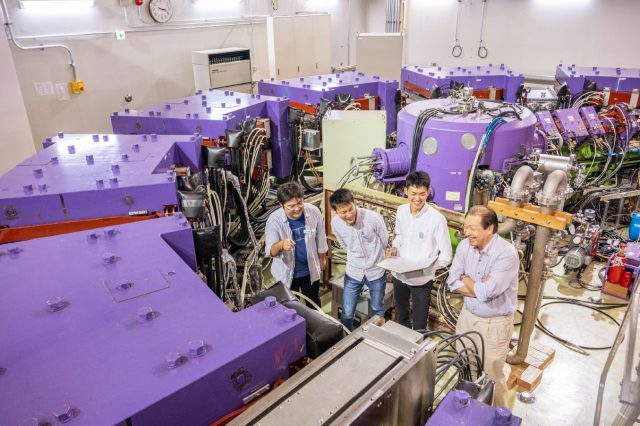
Research Activities
Resources Engineering, and Ⅳ.Civil Engineering) of the Graduate School of Engineering, Kyushu University (under admission administrative process), including those who are graduating from the master's course of these departments, and those who are currently enrolled in a Doctoral course of one of these four departments, including international students and Japanese students.
(Regarding the financial condition, this includes MEXT funded Scholars, including both those who were recommended by the Embassy of Japan and by a university in Japan (General Slot), Scholars funded by JICA Program, by any scholarship programs of their own countries and funding agencies, and privately or self-supported students).
Please submit the application documents during the application period after being approved by your supervisor.
(2) Those who are willing to apply to the Doctoral course of one of the following four departments (I. Applied Quantum Physics and Nuclear Engineering, Ⅱ. Naval Architecture and Ocean Engineering, Ⅲ. Earth Resources Engineering, and Ⅳ.Civil Engineering) of the Graduate School of Engineering, Kyushu University. Residing out of Japan at the time of application.
A. Those who are willing to apply for a scholarship supplied by the Japanese Government (MEXT: Ministry of Education, Culture, Sports, Science and Technology)
1. Recommendation through the Embassy of Japan
2. Recommendation through a university in Japan: General Slot
3. Recommendation through a university in Japan: Special Slot for this Course.
Note:
2 and 3, The numbers of slots for both [2] and [3] are very limited. Contact and ask for advice from your desired supervisor prior to application.
1 and 2: Those awarded as MEXT scholars will be enrolled as "Research Students" on arrival in Japan for one semester. During the period enrolled as "Research Students", the scholars are requested to take an entrance examination to the Doctoral course of one of the following four departments (I. Applied Quantum Physics and Nuclear Engineering, Ⅱ. Naval Architecture and Ocean Engineering, Ⅲ. Earth Resources Engineering, and Ⅳ.Civil Engineering) of the Graduate School of Engineering, Kyushu University. After passing the entrance examination to the Doctoral course of the Graduate School of Engineering, Kyushu University, take the procedure described in (1) above to enter the course.
B. Those who are willing to apply for a scholarship by Japan International Cooperation Agency (JICA)
Earth Resources Engineering accepts scholars granted by a program called the Shigen-no Kizuna Program funded by Japan International Cooperation Agency (JICA).
Consult the JICA Office of your country for the application procedure.
(3) Those who are willing to apply to the Doctoral course of one of the following four departments (I. Applied Quantum Physics and Nuclear Engineering, Ⅱ. Naval Architecture and Ocean Engineering, Ⅲ. Earth Resources Engineering, and Ⅳ.Civil Engineering) of the Graduate School of Engineering, Kyushu University, and are currently enrolled in the master's course of a graduate school of a university in Japan
(Regarding the financial condition, this includes MEXT funded Scholars, including both those who were recommended by the Embassy of Japan and by a university in Japan (General Slot), Scholars funded by JICA Program, by any scholarship programs of their own countries and funding agencies, privately or self-supported students).
Apply and take an entrance examination to the Doctor course of the following four departments (I. Applied Quantum Physics and Nuclear Engineering, Ⅱ. Naval Architecture and Ocean Engineering, Ⅲ. Earth Resources Engineering, and Ⅳ.Civil Engineering) of the Graduate School of Engineering, Kyushu University. After passing the entrance examination to the doctor course of the Graduate School of Engineering, Kyushu University, take the procedure described in (1) above to enter the course.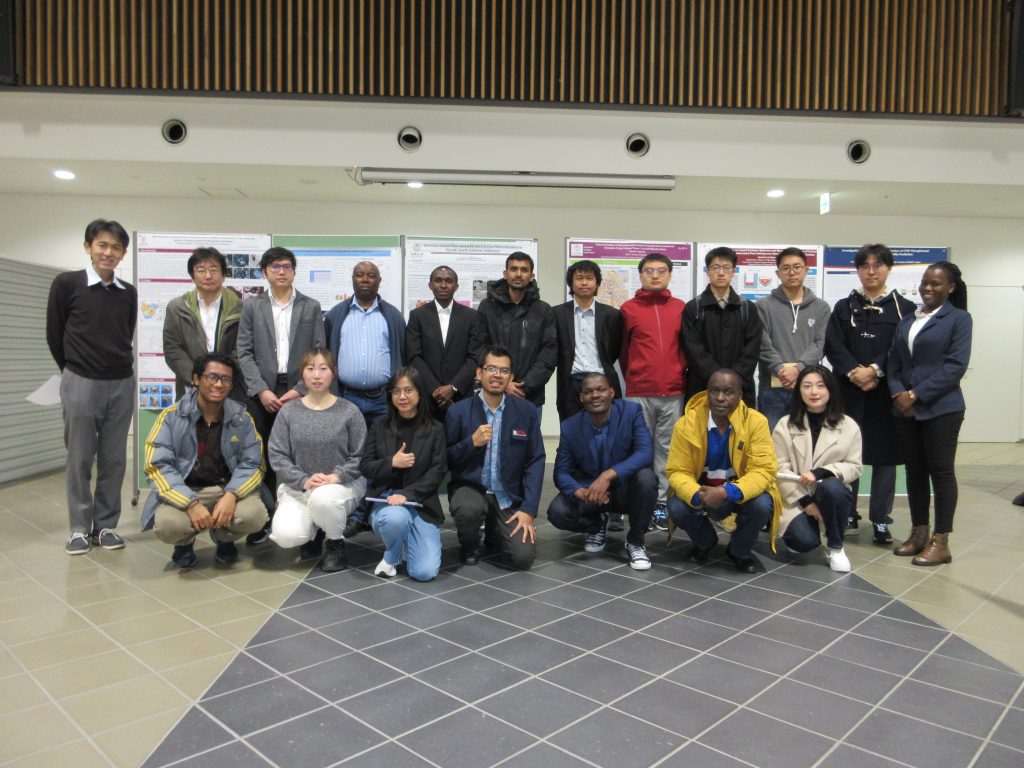
Introduction of each Department and Professors
I. Applied Quantum Physics and Nuclear Engineering
II. Naval Architecture and Ocean Engineering
III. Earth Resources Engineering
IV. Civil Engineering
Contacts
Students Affairs Division, the Graduate School of Engineering, Kyushu University
kotkokusai@jimu.kyushu-u.ac.jp




